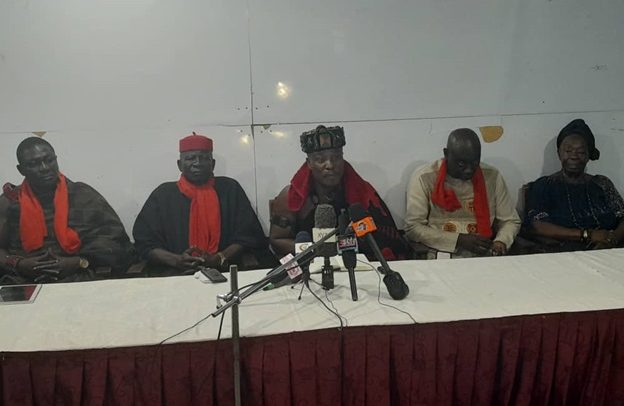The chiefs during the press conference
Some aggrieved chiefs in the Akropong Traditional Area have appealed to the National House of Chiefs to expedite action towards addressing the current chieftaincy disputes between some feuding factions in the area.
Speaking at a press conference on Monday, Nana Kwaw Kuturuku V, Okuman Frankatuhene of Akropong said though they have presented a petition to the National House of Chiefs for some months now, they have not had any positive response until an announcement of a judgment during the week.
He said, “Chiefs should use the power they have judiciously and not to use it against their people. The case was supposed to go for judgment but the chiefs were bribed to stop the motion, which has not been addressed till today.”
According to the group, chieftaincy disputes which date back several years had almost been resolved until 2020 when some unknown individuals attacked some chiefs and people in the area, allegedly to stop them from carrying themselves as chiefs though they were deemed to be occupants of the Akropong stool.
The spokesperson for the group also alleged that many of the youth and a queen mother were brutalised in the process.
He said the National House of Chiefs have refused to act on their petition though they had presented some evidence on some of the challenges Akropong was facing due to some of these chieftaincy challenges.
“We would want the National House of Chiefs to act and resolve our issues. We know they can if they are not influenced by any individual or any group who do not have Akropong at heart. Peace can only prevail if we all make attempt to work at it, which we hope can be done,” he added.
According to him, the Odwira festival which used to host many people from both Ghana and abroad had lost its lustre due to the misunderstanding amongst some feuding factions in the area.
He also asked politicians to work on their respective roles assigned them and desist from meddling in chieftaincy matters, which may sometimes escalate if not addressed by the responsible bodies such as the National House of Chiefs.
By Ebenezer K. Amponsah


